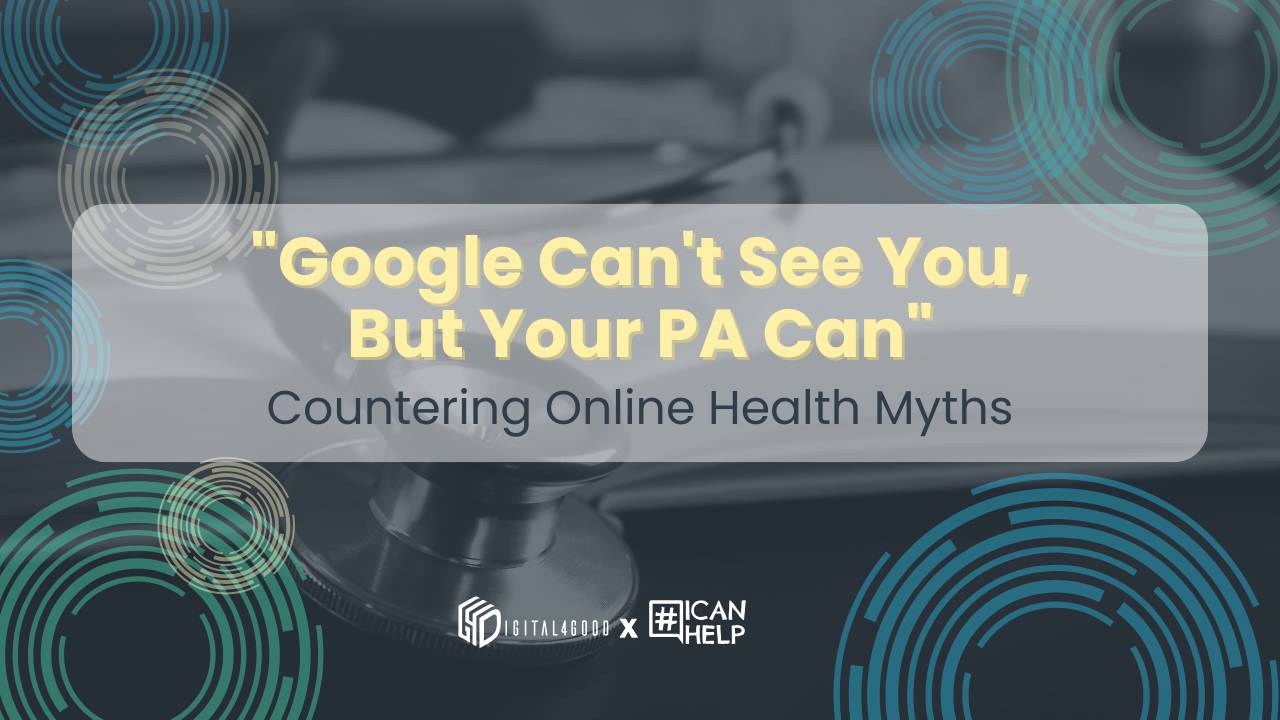Google Can’t See You, But Your PA Can: Countering Online Health Myths
Jul 18, 2025
By: Zohaib Qureishi | Seasonal Public Relations Intern | Digital4Good
You don’t expect to hear TikTok mentioned in a medical exam room, until a teenager walks in convinced she has Lyme disease because of a video she watched.
That’s exactly what happened to Amirah Shaikh, PA-C, a physician associate working at a busy urgent care clinic. And it’s not a rare story.
In my internship at Digital4Good, I’ve been exploring how online misinformation and digital overload affect young people’s health literacy and trust in providers. Through research and interviews, I’ve learned that misinformation isn’t just a digital inconvenience—it’s a public health issue. That’s why I sat down with Amirah to hear her perspective, and what she shared hit hard.
When TikTok Diagnoses You First
Amirah told me about a teenage girl who came in after watching a TikTok about Lyme disease. She had fatigue and joint pain, and the algorithm convinced her it must be something serious. But after lab tests and a real conversation, Amirah diagnosed her with something far more common—and treatable: anemia paired with stress.
“Watching the TikTok just added to her stress,” Amirah said. “After we talked things out, she realized that not everything you see online is true.”
That story stuck with me. The internet gave her anxiety, not answers. And she’s not alone.
When Google Breaks Your Trust
Amirah sees this daily: patients arriving scared, confused, and already convinced of their diagnosis—before ever speaking to a provider.
“Google only gives you a tiny piece of the picture. It doesn’t know your story, your background, your context,” she explained.
And when patients trust influencers or search results more than their own care team, it creates friction. Delayed diagnoses. Conflicting opinions. Emotional stress.
“To give you the best care, we need trust,” she said. “That gets broken when people believe the internet over their providers.”
How Digital Misinformation Harms Patient Care
Here’s how online misinformation shows up in real clinics, according to Amirah:
- People panic over worst-case scenarios.
- They question evidence-based treatments because of trending “natural” alternatives.
- They attempt self-diagnosis or self-treatment, skipping crucial steps.
- They shut down when medical advice doesn’t match a YouTube video.
But Amirah doesn’t shame her patients—she listens first. Then she gently guides them back to truth.
“When patients feel heard, they’re more open to working together on a solution,” she said.
“Google Can’t See You. I Can”
When I asked Amirah what one message she’d post in every exam room, she didn’t hesitate:
“Google can’t see you. I can.”
That line says it all. Algorithms don’t take your blood pressure. TikTok doesn’t know your genetics. You deserve care that sees the whole you—not just your symptoms, but your story.
How This Ties Back To The Digital Health Project
As part of my internship with Digital4Good x #ICANHELP, I’m working on a project that highlights the real-world impact of digital misinformation—especially in healthcare. From interview stories like Amirah’s to flyers and blog posts, we’re creating resources that help young people, parents, and providers navigate the digital world with more clarity and confidence.
This conversation with Amirah proved what we’ve been saying all along: digital literacy is health literacy.
3 Ways You Can Fight Health Misinformation Online
1. Think before you repost.
If it’s not coming from a verified health source or doctor, don’t amplify it.
2. Ask real professionals.
Talk to a school nurse, your doctor, or a trusted adult about symptoms—not just the internet.
3. Promote positive digital spaces.
Follow accounts that encourage curiosity and critical thinking—not fear.
Your digital feed is powerful. It can inform or mislead. Empower or overwhelm. What you choose to believe—and share—can impact not only your mental health, but your physical health too.
We all need reminders like Amirah’s to slow down, step back, and reconnect with real care. Because while the internet is full of advice, only a trained provider can see you fully.
Take Action with Digital4Good
Ready to join the conversation on digital health? Visit Digital4Good to explore our hospital literacy flyer, learn more about digital wellness, or connect with us to share your story.
We’re building a better digital world, one scroll—and one check-up—at a time.
FAQs About Digital Health & TikTok Myths
Is it okay to use TikTok for health advice?
Use it with caution. Follow verified medical professionals only, and always consult a provider before acting on any advice.
What’s the difference between a PA and a doctor?
Physician Associates (PAs) are licensed to diagnose, treat, and prescribe. They work closely with doctors and are trained to provide high-quality care.
How do I tell if online health advice is trustworthy?
Check the source. Verified health organizations, peer-reviewed data, and licensed professionals are your best bet.
Stay connected with news and updates!
Join our mailing list to receive the latest news and updates from our team.
Don't worry, your information will not be shared.
We hate SPAM. We will never sell your information, for any reason.


